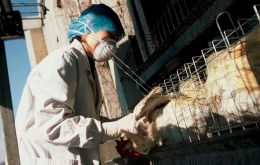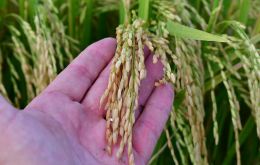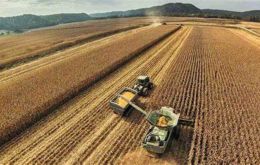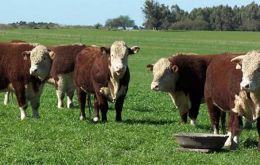MercoPress. South Atlantic News Agency
Agriculture
-
Saturday, October 28th 2023 - 10:26 UTC
BFSAI help with soil erosion and pasture re growth in the Falklands by spreading wool

Members of British Forces South Atlantic Islands, BFSAI, are helping to combat soil erosion and re-growth of pastures in the Falkland Islands.
-
Monday, October 23rd 2023 - 07:01 UTC
Falklands brace for avian flu

Agriculture officials in the Falkland Islands have announced that biosecurity measures have been stepped up in anticipation of the imminent arrival of avian influenza, which is likely to come from a sick bird.
-
Thursday, October 19th 2023 - 09:21 UTC
The impact of Israel/Hamas conflict on global grain and fertilizer prices

The war between Israel and the terrorist group Hamas may have repercussions on global grain prices and could also increase fertilizer prices, as indicated by analyses from Hedgepoint Global Markets and Itaú BBA, reports Globo Rural.
-
Wednesday, October 18th 2023 - 13:29 UTC
Poor performance of Uruguay's ovine sector, hit by low international prices

Exports of the Uruguayan ovine sector reached US$ 157 million in the first eight months of the year, (Jan/August), according to the Uruguayan Wool Secretariat, SUL, which represented a 17% drop in value.
-
Saturday, October 14th 2023 - 10:48 UTC
Record sales for Uruguay in an exceptional year for rice production

For the first time in many years Uruguayan rice farmers are not complaining about the cereal's price or asking for some form of government support. On the contrary the Association of Rice Farmers have admitted to have sold overseas all of this year-s crop an estimated 1,26 million tons out of a total harvest of 1,4 million tons. Uruguay usually consumes 10% of its rice production and the rest is exported.
-
Saturday, October 14th 2023 - 10:00 UTC
Chilean fruit exporters sue major shipping line

Chilean fruit exporters have filed a lawsuit for a “systematic succession of abuses” before the Court of Defense of Free Competition (TDLC) against the Mediterranean Shipping Company (MSC), it was reported in Santiago.
-
Thursday, October 12th 2023 - 07:57 UTC
Strong campaign in UK to stop farmers from overusing antibiotics in their animals

Hospital and school caterers are not doing enough to stop farmers from overusing antibiotics in their animals, according to United Kingdom campaign groups. Such overuse raises the risk of antibiotic resistance rendering key human medicines ineffective.
-
Thursday, October 12th 2023 - 07:44 UTC
Brazil expanding its soy area but corn production is expected to fall as prices drop

Brazilian farmers will have a record soy output in the new season as they are sowing the oilseed over a larger area, the government’s crop agency Conab said this week in the first forecast report for the 2023/24-grain cycle.
-
Wednesday, October 11th 2023 - 19:52 UTC
Clock is ticking for the Big Meat “sunset industry”

By Gwynne Dyer -The French government has just published a decree banning the use of terms like “steak,” “spare ribs” and “ham” on plant-based foods. It’s not that the French are so stupid that they don’t know which is meat from dead cattle and which is “plant-based steak,” a label that has been used in French supermarkets for at least 40 years.
-
Saturday, October 7th 2023 - 09:41 UTC
Uruguayan minister chosen unanimously to head Inter-American Board of Agriculture

Uruguay's Agriculture and Livestock Minister Fernando Mattos was voted unanimously by all 32 attending delegations to chair the Inter-American Board of Agriculture (IABA) for the period 2023-2025 during a convention held in San José, Costa Rica, it was announced Friday. Mattos' candidacy was put forward by the representatives from Argentina, it was also reported.